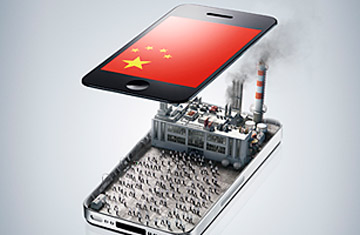
(3 of 7)
Other Western companies are trying to increase market share in China by catering to local customers' preferences, whether by introducing skin-whitening creams for young women who long for pale complexions or by expanding the backseat legroom in the sedans that are often driven by chauffeurs. But Apple is selling the unique, or at least uniquely American, appeal of its products in China. The company's emphasis on endless iPhone personalization--download this app, snap that photo, make your phone an extension of yourself--works. "People in China buy Apple because it symbolizes an individualistic Western lifestyle," says Yang Xi, a 29-year-old in Beijing who owns two Apple laptops, seven different iPods, an iPhone and an iPad. "In China, there are so many people. We like the idea of something that makes you special, that you can make your own."
Still, Apple is beginning to recognize the power of the localized pitch. As popular as Apple is, cheaper smart-phone brands like Samsung sell better in China. Local Apple clones that rip off iPhone styling have also captured a chunk of the market. Part of this is simply a matter of price. In a country where an urban Chinese person's annual income averages less than $3,500, an iPhone is a luxury product that costs more to buy in China than in the U.S. To compete, Apple in mid-June at long last unveiled targeted features to woo Chinese consumers. Updated software makes it easier to use Chinese Web offerings like Weibo, a microblogging service; video site Youku; and search engine Baidu. (Twitter, YouTube and normal Google searches are banned in China.) In the fall, Siri, Apple's artificial-intelligence software, will begin speaking Mandarin and Cantonese. Apple has also received local approval to open two more stores in Chinese cities.
These Apple stores will face fierce competition from unauthorized outlets, which have proliferated across the country and sell products for up to 50% more than officially sanctioned prices. Fake Apple stores rip off the detailing of real ones, from the giant, glowing Apple icons and minimalist wooden furniture to the signature blue T-shirts worn by staff. Last year, authorities in one southwestern city, Kunming, closed 22 stores that were illegally using the Apple logo, an icon so alluring in China that it sometimes is used on products beyond what the American company has dreamed up. Knockoffs of the iPhone 5 (some marketed as "hiPhone 5") are widely available in Chinese computer malls, even though the iPhone 5 does not yet exist. In February, police in the central city of Wuhan seized, for safety reasons, nearly 700 gas stoves that mysteriously had been branded with iPhone logos.
Coming Clean
Apple will also have to win over the Chinese by convincing them that the company has the best interests of the People's Republic at heart. The vast majority of Chinese aren't up in arms about labor conditions at Apple's supplier factories. A cluster of suicides by Foxconn workers a couple of years ago elicited much more coverage in the West than in China. (Another Foxconn employee jumped to his death in June.)
